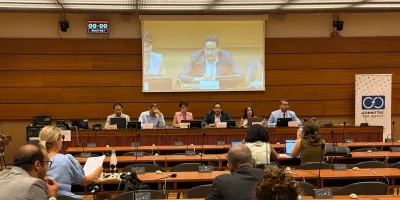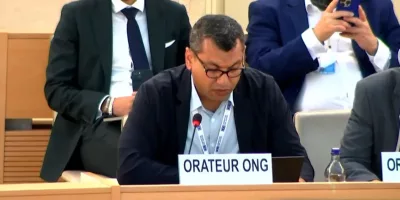News briefing
Translated and edited by: Committee for Justice
Geneva: 28 April 2022
UN experts have expressed concern about the arrest and detention in Serbia of a Bahraini labor rights activist, Ahmed Jaafar Muhammad Ali, and his extradition to Bahrain on January 24, 2022, on the basis of a red notice, although he may face the death penalty there.
Charges related to terrorism after leaving the country
The experts stated in a memorandum sent to the Bahraini authorities on February 21, 2022, that because of Jaafar’s activity, he was arrested and tortured before deciding to leave Bahrain in 2011. He then resided in Iran with his wife and four children, before moving to Serbia in November 2021 to pursue his higher education, and he requested asylum for himself and his family.
The experts added that a few days after his arrival in Belgrade, on November 3, 2021, Jaafar was arrested based on an Interpol red notice, at Bahrain’s request, on terrorism-related charges (attempting to kill a police officer, manufacturing and possessing explosives) between 2013 to 2015.
Defective Serbian procedures
The experts noted that the Belgrade Supreme Court agreed to extradite Jaafar to Bahrain without assessing the risks of possible grave violations of his human rights in the event of his return, and that he was deprived during his detention in Serbia of communication with the outside world, and the Supreme Court also rejected an appeal request submitted by his lawyer, on January 18, 2022, and notified the Ministry of Justice of its decision authorizing his extradition.
The experts explained that after that, his lawyer submitted a request to the European Court of Human Rights requesting a review of the Serbian court’s decision to approve the extradition of Jaafar, citing a possible violation of Article 3 of the European Convention on Human Rights, and based on that request, Serbia was supposed to refrain from handing him over to Bahrain until February 25, 2022, but it went ahead on February 24, 2022.
Prevented from communicating with his family and lawyer
The Bahraini Ministry of Interior issued a statement upon the arrival of Jaafar to Bahrain, in which it indicated that he had returned as a result of cooperation with Interpol, and stressed that he faces three charges of life imprisonment and an additional ten years for terrorism, and the court decided to strip him of his Bahraini citizenship as part of the ruling issued.
The experts said in their memo that since Jaafar returned to Bahrain, he was held in the Criminal Investigation Department for 24 hours, before being transferred to the Dry Dock Detention Center, on January 25, and then to Jau Prison, on February 5, where he was not allowed to communicate with his family. He was allegedly asked to sign papers to appeal his conviction, without the presence or advice of a lawyer.
The experts also confirmed that on February 8, 2022, during the last call between Jaafar and his family, he reportedly showed potential symptoms of Covid-19, including runny nose, cough and high temperature.
Concerns about deprivation of basic rights
The experts expressed grave concern about the denial of due process and a fair trial, including his right to be presumed innocent, his right to confidential and regular access to legal counsel of his choice, his right to prepare and exercise his right to defence, and his right to challenge the legality of his arrest, as well as the possibility of imposing the death penalty on him in the current circumstances.
The experts also expressed their deep concerns about the abusive application of national anti-terrorism legislation in Bahrain, and the exploitation of international security cooperation mechanisms in this context.
UN demands from Bahrain
The experts made several demands from the Bahraini authorities, the most important of which are:
– Clarify how Jaafar was able to commit the crime of which he was accused, tried and sentenced, even though according to the information in their possession, he was living in Iran during the period 2011-2021.
– Providing detailed information about the conditions of his detention during the first stage of his detention when he was forcibly returned to Manama by the Serbian authorities, and what authorities interrogated him about.
– Providing information regarding the legal representation of Jaafar, and whether he was present during his interrogation and the procedures for his appeal, with an explanation of whether he was asked to sign the appeal documents without the presence of his lawyer.
– Provide details of the circumstances under which incriminating evidence against Jaafar was obtained, including alleged forced confessions by other defendants, which were apparently part of the evidence held by the court against him.





